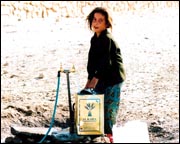18
June 2001
![]()
2. "3 nations to rehearse Mideast war", Turkey, Israel, U.S. plan massive exercise over Mediterranean.
3. "Honour killings persist in Turkey", minor sentences imposed recently on three brothers for an honour killing have highlighted the Turkish law's leniency in such cases and the plight of women under feudal rules which persist in this EU-wannabe nation.
4. "We are still trying to deceive", the constitutional amendment proposals are a typical Turkish classic. In other words an attempt to show things are being amended by pulling the wool over people's eyes and changing nothing. It is as if everybody is stupid and only we are smart.
5. "Ecevit offers immediate reforms to calm turkey's economy", soaring prices and lay-offs continue to hurt people.
6. "Its been two weeks", attorneys who wanted to travel to Imrali island to meet with PKK President Abdullah Ocalan once again were forced to turn back due to "inclement weather." The attorneys were not allowed to meet with Ocalan last week either, based on the same justification.
1. - AFP - "Turkish prison protest claims 24th victim":
ANKARA
An ongoing hungerstrike over reform in Turkey's jails has claimed
its 24th life, after a left-wing militant died who had been fasting
for 239 days, the Anatolia news agency reported Sunday.
Veli Gunes, 45, who was jailed in the northwestern region of Izmit for supporting the Revolutionary People's Liberation Front, blamed for numerous attacks in the country, died on Saturday. The protest, which began in March, is against prison reforms that aim to keep prisoners in smaller cells rather than dormitories -- a move which protestors claim will increase harassment and even torture by prison guards. The protest was originally called in October and reached crisis point when Turkish authorities sent security forces in to break up demonstrations in December in a crackdown that left 30 prisoners and two police officers dead.
The Turkish government seized the opportunity to transfer
over 1,000 prisoners into the new type jails, but the move has not deterred
hunger strikers. Ankara has since announced a package of measures in
response to the strikers' demands, including the appointment of a judge
to address abuse claims, but protestors and human rights groups have
labeled the concessions as insufficient. ![]()
2. - World:Net - "3 nations to rehearse Mideast war":
Turkey, Israel, U.S. plan massive exercise over Mediterranean
One of the biggest air force exercises ever staged in the region
takes place Sunday over southern Turkey with more than 500 craft from
the U.S., Israel and Turkey participating, according to DEBKA-Net-Weekly,
the online intelligence source.
"Anatolian Eagle," will involve fighters, bombers, surveillance craft, marine vehicles and refueling planes, as well as combat helicopters and will be the first joint exercise by the three air forces. It will last 13 days, ending June 29. Hundreds of craft will zip round the skies over most parts of the eastern Mediterranean and Turkey's frontiers with Syria, Iraq and Iran. Some of the U.S. craft will make use of carriers cruising in the Mediterranean and Red Sea, and Israeli air units will return home periodically to refuel and re-arm at their bases in Neve David and Hatzor, before rejoining the exercise.
DEBKA-Net-Weekly's military experts reveal that Anatolian Eagle's secret objective is to make tangible preparations for a Middle East war. The three air forces will be rehearsing a Turkish-U.S. response, should Syria, Iraq and Iran - together or singly - launch a surface missile assault on Turkish and U.S. military bases inside Turkey, as part of an overall offensive against Israel.
This offensive might come in the form of a missile raid or a ground invasion through Jordan or Syria. The 1995 Turkish-Israel military pact provides for Israel to use Turkish air bases if attacked.
The basic premise underlying the air force exercise is that in the event of a full-blown Middle East war, either of those three neighbors of Turkey will send missiles against military installations in southern Turkey, primarily the big base at Incerlik, for the purpose of demolishing any Israeli warplanes that are on the ground and preventing the Israeli air force from using Turkish soil as a launch pad for reaching targets in Syria, north Iraq, northeast Iran, Iraq's western desert and northeast Iraq.
Based in those regions are the very surface missile batteries that Iraq and Iran mean to deploy against Israel in a war.
The joint exercise will also drill fighter planes in missile-launcher destruction tactics. For the first time, the Arrow anti-missile missile system will be tried out in mock battle conditions. DEBKA-Net-Weekly adds that the first operational version of the Arrow will be taking part in the exercise and fill two functions:
Its advanced radar will be required to pick up surface missile launchings against Turkish targets in time to direct round-the-clock airborne air units to home in on the launchers and destroy them before the enemy has time to conceal them.
The Arrow will also be dispatched to intercept enemy missiles penetrating Turkish air space and blow them out of the air.
There are signs that the imminent Anatolian Eagle exercise
is generating some edginess in Baghdad, Tehran and Damascus. Earlier
this week, Syria sent a military delegation to Ankara to quiz Turkish
officials about the Israel air force role. According to DEBKA-Net-Weekly
sources, the Turks told their visitors politely but firmly to mind their
own business. ![]()
3. - AFP - "Honour killings persist in Turkey":
ANKARA / by Hande Culpan
Minor sentences imposed recently on three brothers for an honour
killing have highlighted the Turkish law's leniency in such cases and
the plight of women under feudal rules which persist in this EU-wannabe
nation.
Planned amendments to the penal code largely fail to address or discourage the centuries-old, blood-chilling practice of murdering women on orders of family elders to uphold their collective honour, invariably linked to female sexuality, analysts say. In the most recent example, an Istanbul court first jailed the brothers to life for sending their 15-year-old sister to death by throwing her off a bridge because she had dishonoured the family by frequently running away and prostituting herself.
But their terms were subsequently reduced to between four and 12 years on the grounds that the victim had "provoked" the murder through her acts. The trial's outcome is one of many rulings where men have received relatively short prison terms for honour killings. Such murders, on which there are no statistics, originated from the Arab and Kurdish communities in underdeveloped southeastern Turkey where feudalism maintains its iron grip on the people, according to Mehmet Farac, a journalist who has published a book on honour killings. The brutal practice spread to the rest of the country through migration, Farac says. "The family council takes the decision to kill a woman and appoints an executioner, who is almost always a minor to ensure that he gets a lighter sentence," Farac told AFP. His book, "Women in the Grip of Tribal Customs", recounts the murders of five girls between 1994-1998 in the southeastern province of Sanliurfa -- with sizeable Arab and Kurdish communities -- for what their families regarded as disobedient and shameful behaviour. Two of the girls -- one as young as 12 -- had their throats slit in public squares, two others were run over by tractors and the remaining girl was shot dead by her younger brother. Farac doubts the true number of honour kilings will ever emerge in the region where many do not register their daughters at birth and where a woman's place is in the home. "It is very easy to eliminate a person who does not officially exist. Furthermore, witnesses often do not report these murders because they also believe the killing is justified," he said.
But the biggest obstacle to preventing these murders lies in a penal code article which stipulates greatly reduced prison sentences for crimes committed "under provocation", said lawyer Canan Arim, a forerunner in the campaign to fight violence against women. "The killers almost always plead heavy provocation due to the victim's behavior which they say was against tribal customs, and get away with minor prison sentences which are of no deterrent nature," she said. Arim added that since the murderers also deny in court any joint family decision to do away with the victim, the real instigators of the killing -- the family elders -- go unpunished. "Due to legal discrepancies, violence against women in Turkey is basically a state policy," she added.
A comprehensive plan to amend the Turkish penal code would
erase a clause envisaging lesser sentences for those who catch a relative
in the act of adultery and then kill them, but keep the provocation
article in place. "To end the violence, there must be no reduction
in the sentences. Murder is murder," Arim said. Legal amendments
will not bear fruit unless accompanied by moves to ensure more widespread
education, to raze the feudal system and eradicate poverty, Farac said."Only
when the supreme hold of the tribal customs over the people is broken
can we ensure that the public disapproves of honour killings and stops
treating the perpetrators as heros who have cleaned their family's honour
with blood," he added. ![]()
4. - Turkish Daily News - "We are still trying to deceive":
Opinion by M. Ali Birand
The constitutional amendment proposals are a typical Turkish classic.
In other words an attempt to show things are being amended by pulling
the wool over people's eyes and changing nothing. It is as if everybody
is stupid and only we are smart.
Turkey has moved into action to get the Constitution amended,
or to be more precise to make it comply with the international agreements
it has signed.
The aim is both to get rid of the problems and tensions within the country
and to show the world we are not constantly in-fighting.
The All-Party Accord Commission has reached a consensus on several articles.
You look on with excitement but the view you see is a comedy.
For example, the article to abolish the death penalty...
It has been abolished across Europe and will have to go in the end in
Turkey...
Really. They reached such an agreement that it has been written to make
eyes at the MHP voters and tell them, "Don't worry, we are definitely
going to hang Ocalan."
Another example concerns the article lifting the ban on all languages
that are not Turkish.
The provision, "The use of any language other than Turkish is forbidden"
will be lifted. That's it.
I mean, just as in these two examples, there is no revision at all.
Yet, this amendment was made to relax a practice that had been making
Kurdish-origin citizens unhappy. The article is being removed from the
Constitution, but the articles in law banning Kurdish are being left
in place.
Are we trying to dupe children?
Do you think the EU will fall hook, line and sinker for
these amendments?
Are we ever going to stop talking nonsense?
Is it really necessary for the ECHR or the European Council of Ministers
to force us into abolishing the death penalty or leaving Kurdish to
be used freely?
We can resist all we want; the MHP can put on all the pressure it wants
but sooner or later Turkey will abolish the death penalty and will allow
Kurdish to be used freely.
These kinds of approach will never enable us to escape the dead end
we have gotten ourselves into with our deceptions and oriental cunning.
"Sleep well, Turkey"
I am reading Guneri Civaoglu's "Impressions of China" in Milliyet.
As I read on, I begin to fume.
Just look at what has become of China.
Its population is 1.2 billion. many times larger than Turkey.
There are 59 separate languages and dialects spoken.
The country is run by the Communist Party, yet politics does not get
involved in the economy.
Inflation is at 2 percent.
Foreign investment is at $500 billion.
In the 1950s China was struggling to get to its knees.
Now, it is not just its land mass and population that are huge; it is
becoming an economic giant as well.
Doesn't this view really make you mad?
What is Turkey doing?
The headline Civaoglu placed on his article is right on
the mark: "Sleep well, Turkey". ![]()
5. - Frankfurter Rundschau - "Ecevit offers immediate reforms to calm turkey's economy":
Soaring prices and lay-offs continue to hurt people
ATHENS / by Gerd Hoehler 
Bulent Ecevit, the Turkish prime minister, does his best to spread
optimism. "We are at pains to show financial discipline,"
he says.
According to his timetable, Turkey will have surmounted its acute economic crisis in several months and things will start picking up.
But the business community fears a new wave of bankruptcies, and increasing number of Turks who now have work are worried they may lose their precious jobs.
Ecevit has pledged to see all outstanding reform legislation complete parliamentary hurdles by the end of June. Measures on the bill include the deregulation of the previous state monopoly on the tobacco market, more flexible labour laws, more transparent regulations governing the awarding of state contracts and fresh legislation to oversee insolvencies in the banking sector.
The majority of the reforms, though, have already been wrapped up by Economics Minister Kemal Dervis. Among those already enacted are the autonomous status granted to Turkey's central bank and the law regulating the privatisation of Turk Telekom, the state telephone provider. Dervis, who left his job as vice-president of the World Bank to hurry to Turkey's rescue at the beginning of March, has already replaced the management of the country's loss-making state banks, which are now due for a shake-up to prepare for their imminent privatisation.
On Friday, the government presented the draft of the supplementary budget. The previous budget had become obsolete following Ankara's decision, at the height of the financial crisis on February 22, to release exchange restraints on the lira. Within a few days, the national currency had shed up to 45 per cent of its market value.
The supplementary budget has a volume of around 25 billion dollars, with the lion's share - over 40 per cent - earmarked for debt servicing purposes, thus doubling Turkey's original estimates of interest and repayments. Finance Minister Sumer Oral has calculated that around 95 per cent of all tax revenues will be spent on servicing the country's debts. Nothing illustrates Turkey's financial crisis clearer than this figure.
Above all, the clean-up in the banking sector is bound to come at a price. Debts held by the state banks and liabilities of 13 insolvent private financial institutions now under the receivership of the state's deposit guarantee fund, were recently converted into domestic treasury bonds. This alone amounts for a volume of approximately 37.5 billion dollars.
The aid package approved by the International Monetary Fund at the end of May amounted to around 15.5 billion dollars, giving it the distinct appearance of emergency assistance. Of course, Turkey will require further cash injections and talks with the World Bank over additional loans are now taking place. Economics Minister Dervis is also sounding out possibilities of loans in the United States, Japan and Germany.
Despite his rigid austerity programme, Dervis enjoys a
higher confidence rating among the public than any other politician,
say opinion polls. But foreign creditors are asking themselves whether
the non-affiliated minister can hold his ground against his established
card-carrying colleagues in view of reforms which rock at the very structures
which provide politicians with wealth and influence. The reduction of
subsidies in the agriculture sector is an especially controversial point
that is flatly opposed by the far-right Nationalist Action Party, a
member of Ecevit's coalition, whose clients are largely made up of farmers
and big landowners.
While many in the coalition are straining against the economics minister's
plans to overhaul the financial system, Turkish businessmen are demanding
decisive reforms on the political stage too. The Turkish Union of Chambers
of Commerce and Commodity Exchanges, or TOBB, has now called for changes
in the country's party and electoral laws. The aim of the reform is
apparently to encourage more inner-party democracy and a fairer voting
system. Similar demands were only recently put forward by the Turkish
Industrialists' and Businessmen's Association.
President Ahmet Necdet Sezer and Justice Minister Hikmet Sami Turk have also backed reform of the laws regulating elections and politicial parties. These moves could at last provide the impetus behind a radical shake-up of the political system, whose decrepitude is a key cause of the latest financial crisis.
The majority of business people, says a TOBB survey, see current developments sceptically. Worringly, far from expecting an upturn by the end of a year, almost 75 per cent of respondents anticipate a downturn. Other findings in the poll reveal that 32 per cent of businesses are planning to further reduce production and 41 per cent expect lay-offs to occur at their plants.
The economic crisis of the last three and a half months has seen the collapse of thousands of small- and medium-sized businesses. All in all, 500,000 people have so far been laid off. But even those who have been lucky enough to hang on to their jobs are feeling the effects of the crisis as the lira's devaluation has brought with it painful price levels. Turk-Is, the country's trade-union federation, estimated that in January a family of four needed 175 million lira to buy food and other basics. Now that figure has risen to just shy of 220 million lira. The present minimum wage in the state sector is currently fixed at 102 million lira - around 86 dollars.
A new reality TV show on the private Channel D is now
due to explore whether it is possible to survive on this sum by asking
candidates to get by on 102 million lira over 30 days. The winner will
be rewarded with 25 billion lira (around 21,600 dollars) and a car.
![]()
6. - Kurdish Observer - "Its been two weeks":
Attorneys who wanted to travel to Imrali island to meet with PKK President Abdullah Ocalan once again were forced to turn back due to "inclement weather." The attorneys were not allowed to meet with Ocalan last week either, based on the same justification.
Hatice Korkut, Dogan Erbas, and Irfan Dundar, members
of the Century Law Firm, attempted to depart from the port of Gemlik
to go to Imrali Island the other day. But after traveling part of the
sea voyage, they were forced to turn back because of what the officials
termed "inclement weather." 
Making a statement to our newspaper, Atty. Hatice Korkut stressed that
it had been essential for the attorneys to speak with Ocalan, both because
there is a case to be heard against him in Ankara on June 31 and they
need to finish preparations of the defense to be presented in the European
Court of Human Rights.
Korkut criticized the fact that, more that the weather
conditions, it was the small size of the boat and its inability to stand
up to unfavorable weather conditions that prevented them from going
to the island to meet with their client Ocalan. Korkut underlined that
their time to meet with their client was in any case limited and far
from sufficient, and said that their inability to meet with their client
two weeks in a row also made their job all that much more difficult.
Korkut stressed that they had previously met with the concerned officials
to discuss this and asked for the necessary transportation and other
issues to facilitate their visits, and that they would now make a written
application to the Bursa State Prosecutor's Office on this subject.
![]()